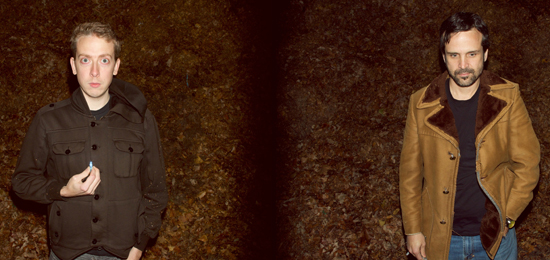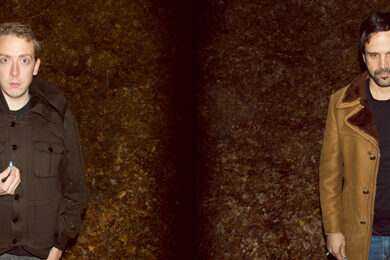The Revival Hour are John-Mark Lapham and David Stith. Their debut EP, Clusterchord, is an American gothic brew of 60s R&B, pop and rousing electronic soundscapes. Stith’s lyrics fizz with foreboding and ragged horror, sparked by his upbringing in an evangelical Christian family – as a child, the vocalist would regular have ‘demons’ cast from him at his local church.
Although both Stith (with a 2009 solo album, Heavy Ghost, released on Sufjan Steven’s Asthmatic Kitty label) and Lapham (as a member of Manchester folktronics ensemble The Earlies and on his 4AD collaboration with Micah P. Hinson) have rich musical pedigrees, The Revival Hour seems to be a meeting of minds for two men who share a common history.
While Lapham grew up in the ultra-conservative Texan town of Abilene (he reveals that only Provo – the birthplace of Mormonism – in Utah, is considered more right-wing), Stith’s childhood was dominated by the extreme form on Christianity known as Wesleyanism. As two gay men, both implicitly understand the daily challenges each faced by either living in Abilene or having to endure a branch of Christianity that Stith describes as "puritanical as you can get."
When we speak by Skype video link, both Stith and Lapham appear to have found their musical soulmate. While Lapham talks fondly about his time in Manchester (initially sharing a bedsit with rats and feasting in Rusholme’s Curry Mile), Stith is resolute and honest about his family’s non-acceptance of his sexuality. Indeed, The Revival Hour is the devastating sound of two colliding worldviews.
Unimaginative first question alert – how did you meet each other?
John-Mark Lapham: We met through a mutual friend who works in music PR. I was on another project called The Late Chord, which was a 4AD project with the singer Micah P. Hinson. Micah and I tried for a few years to record an album and we realised we weren’t really on the same page, so that fell away. I don’t do vocals at all and I had been looking for a singer for a couple of years. I had some instrumentals compiled and our friend sent me a box of promos of acts he was working on. One of the things was a DM Stith EP. I put it on and immediately knew it was exactly what I was looking for. I’d been looking for a kind of spooky vocal to go with this one particular song and I hadn’t heard of any current singer that had anything close to what I wanted. I sent the song to David and he started writing with it immediately and added his own ideas. It went from there and then flowed really quickly. We decided to do another one, and then another one.
What was it about David that ‘clicked’ with you?
J-ML: I was a fan of his EP and I started thinking of how I would approach him as a singer. It took us a while of fumbling around to figure out what we wanted our sound to be. We both like classic production – we are fans of Dusty Springfield, Roy Orbison and that sort of thing – but we are also really into technology and trying to do something interesting with that. We didn’t want it to be a homage to an old sound.
So, how quickly did you settle on the sound for The Revival Hour?
David Stith: We nailed it on that first song, but then it was a matter of taking it apart and working out what it was we liked about it and wanted to keep. We had a lot of material before we settled on a sound – we scrapped about 50 or 60 minutes of music along the way. But we developed a really close friendship really quickly so it seemed like we had to see this through. Now it has become something which is more self-perpetuating.
I’m decidedly ‘ungodly’ and I believe you were both brought up in very religious environments. What was that like?
J-ML: My family weren’t obsessed with religion but I come from a town in Texas called Abilene, which is known for being one of the most conservative towns in the United States. There is a church on every corner. Abilene is also extremely right-wing – it has a big billboard thanking George W. Bush for his service. I grew up in that environment realising that I was gay. That’s where the friction comes from. A lot of my aesthetics are informed by certain aspects of that town. I actually like some of the weirdness of that sort of environment and how that feeds into a need for subversion. I was an awkward, lonely teenager but I never really got indoctrinated into the hardcore religious aspects. I got away relatively unscathed, but had my own struggles coming out of that and not feeling like I was evil or going to hell.
DS: I grew up in a more cult-like environment. My family are all evangelical Christians. They preach that you have to beware of evil thoughts because demons are inside you. I’ve had demons cast out of me in church. The sector of evangelical Christianity I grew up with is called Wesleyanism, which is part of the holiness tradition and is totally ridiculous. It is as puritanical as you can get. It’s all about the personal responsibility to stay away from evil and that you won’t get to heaven unless you purge yourself of all evil. My aunt will take her harp to the mall and play to get angels to come down and help scare off some of the demons. So, I’m still dealing with that stuff. But, I’m not angry or disassociated with my family. I still talk to them every day and I love them very much. I’m not confronting them about the way they live – I’m trying to deal with my experiences.
The Revival Hour feels quite dark and gothic. How has your upbringing affected your music and lyric-writing?
DS: I dealt with it a lot on my solo album although that was a lot more introspective. For The Revival Hour I am trying to deal with it in a more public and approachable way. Rather than singing from my own perspective all of the time, I sing from the perspective of different characters on the album. So, for example, ‘Pyre’ is sung from the perspective of a church-leader with this self-destructive religious idea that he will burn for you and you will burn with him. However, for both of us, the foil for distrusting the church has been through sexuality. We are both gay. I’ve only come out in the last two years, so, for me this record is very much dealing with those two concepts and how they fight against each other. My parents refuse to allow me to tell the rest of the family about it – I’m not allowed to talk about it. My parents are really excited about my music stuff but they don’t really believe I am gay.
I believe ‘The Revival Hour’ was a religious radio show. Is that how your name came about?
DS: Sort of – they used to have old-fashioned ‘revival hours’ in my church. It’s back to the frontier church idea, where someone comes through town and sets up in a tent and prophesises. It’s turned into pamphlets and radio shows and all this other stuff. The revival hour is like a hokey praise party.
J-ML: Maybe that’s what we are.
David, what music did you listen to as a child and how affected was it by your family’s religious beliefs?
DS: I was only allowed to buy Christian albums – but my parents didn’t know what was Christian and what wasn’t. I remember being in high school and my mum wanting to talk to me about my Nine Inch Nails album. Until I was 13, I was only listening to Christian choir music and classical music. After that I started listening to rock, but I don’t think I even heard The Beatles until I was in college. I liked industrial and death metal. But I hold on to a lot of music I grew up with. A lot of it is very beautiful, aside from the lyrical content.
John-Mark, you lived in Manchester for over a decade while playing with The Earlies. How did a Texan fare in my rainy hometown?
J-ML: I didn’t find Manchester to be that much of a culture clash. I’d always felt some kinship to England; I’d always liked English music better than American music, back in the day. It wasn’t so long ago that you had some really interesting, artful music in the Top 10, like in the early 80s with all those electronic bands – like Japan and Cocteau Twins. Being from Abilene, Texas, it was so exciting growing up to think there was this magical land where all this music was championed.
You’ve just released an EP, Clusterchord. How indicative is it of your imminent debut album?
J-ML: We did the album first. There are similarities – we are in the same sonic realm – if I can use the term ‘sonic realm’.
Of course – you are talking to a music journalist.
J-ML: [Laughs] The album is more focused – it’s like all of ideas put into one, streamlined set of songs. It’s more cohesive.
DS: I think the album is sexier. The EP is more statement-oriented; the album is a little more slinky and sexy.
J-ML: I don’t know what he’s talking about.
DS: We are trying desperately to seduce people on the album. The EP is ‘here we are’. The album is ‘here is my pee-pee’.
J-ML: You can put that for the title of the article.
Clusterchord is out on November 5th via Antiphon. The Revival Hour play the following UK dates in November:
NOVEMBER:
20th – Manchester, Band On The Wall
21st – Leeds, Brudenell
22nd – Liverpool, Parr St Studio 2
23rd – Norwich, Arts Centre
26th – Brighton, Komedia
27th – Bristol, Louisiana
28th – Exeter, Phoenix
29th – London, Village Underground
30th – Oxford, Jericho



